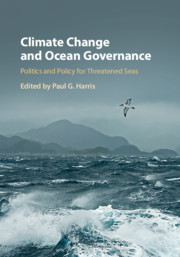Climate Change and Ocean Governance Politics and Policy for Threatened Seas
Langue : Anglais
Coordonnateur : Harris Paul G.

Offers a multidisciplinary edited volume on policy dimensions of climate change for the world's oceans, for researchers, policymakers and activists.
Climate Change and Ocean Governance brings together authors from political science and cognate disciplines to examine the political and policy dimensions of climate change for our oceans. The environmental, social and economic consequences of oceanic change present tremendous challenges for governments and other actors. New and innovative policies for governing oceans and seas - and for managing vital marine resources - have never been more important. Existing national and international institutions for marine governance that were created when oceanic conditions were relatively static may not be adequate for a future characterized by continuous oceanic change. Responses to oceanic change will result in winners and losers, and thus will involve politics in all its manifestations. This book reveals the unavoidable connections between climate change, the oceans, and questions of governance. It provides valuable lessons for researchers, policymakers and activists concerned about governing oceanic change into the future.
Part I. Introduction: 1. Climate change at sea: science, impacts and governance Paul G. Harris; 2. The ocean governance regime: international conventions and institutions Elizabeth Mendenhall; Part II. Vulnerable Islands and Coasts: 3. Political economy of coastal development: the case of the Caribbean Lisa Benjamin and Adelle Thomas; 4. Coastal development and climate risk reduction in the Persian/Arabian Gulf: the case of Qatar Mohammad Al-Saidi; 5. Adapting to sea level rise in the Indian Ocean: the cases of India and Bangladesh Arne Harms; 6. Coastal risks from typhoons in the Pacific: the case of the Philippines Noralene Uy and Joe-Mar Perez; 7. Ocean policy perspectives: the case of Indonesia Achmad Poernomo and Anastasia Kuswardani; 8. Politics of rising tides: governments and nongovernmental organizations in small island developing states Ian McGregor and Hilary Yerbury; Part III. Marine Fisheries and Pelagic Seas: 9. Climate change and fisheries politics: case studies from the United States, New Zealand and Norway Andrew Tirrell; 10. Policy options for marine fisheries: potential approaches in a changing climate Wendy E. Morrison and Valerie Termini; 11. Large marine protected areas and ocean resilience: stakeholder conflict in pelagic seas Justin Alger; 12. Climate change and contested marine areas in the Arctic: the case of Svalbard Rachel Tiller and Dorothy Dankel; Part IV. Changing Polar Seas: 13. Climate change and the Southern Ocean: the regime complex for regional governance Marcus Haward; 14. Policy responses to new ocean threats: Arctic warming, maritime industries and international environmental regulation Benjamin Hofmann; 15. The Arctic Ocean's melting ice: institutions and policies to manage black carbon Thomas L. Brewer; Part V. Institutions and Law for Ocean Governance: 16. Contested multilateralism: towards aligning regimes for ocean and climate governance Reuben Makomere and Kennedy Liti Mbeva; 17. Climate change in the Coral Triangle: enabling institutional adaptive capacity Pedro Fidelman; 18. Non-territorial exclusive economic zones: future rights of small island states Ori Sharon; 19. International law and marine ecosystem governance: the climate change nexus Freedom-Kai Phillips and Konstantia Koutouki; 20. Managing marine resources: can the law of the Sea adapt to climate change? Anastasia Telesetsky; Part VI. Policies for Ocean Governance: 21. The plastic-climate nexus: linking science, policy and justice Peter Stoett and Joanna Vince; 22. Financing emission reductions: forest mechanisms as a model for coral reefs Kamleshan Pillay, Yanasivan Kisten, Albertus Smit and David Glassom; 23. Capturing a moving target: decarbonizing shipping through informational governance Judith van Leeuwen; 24. Energy from the sea: challenges and opportunities Christina Reichert and John Virdin; 25. Climate change and navies: bracing for the impacts Kapil Narula; 26. Geoengineering at sea: ocean fertilization as a policy option John T. Oliver and Steven M. Tucker; Part VII. Conclusion: 27. Ocean governance amidst climate change: an essay on the future Paul G. Harris.
Paul G. Harris is a political scientist and the Chair Professor of Global and Environmental Studies at the Education University of Hong Kong. He is author or editor of many books on global environmental politics, policy, and ethics, including Global Ethics and Climate Change (Second Edition, 2016), the Routledge Handbook of Global Environmental Politics (2016, ), and What's Wrong with Climate Politics and How to Fix It (2013).
Date de parution : 02-2019
Ouvrage de 460 p.
17.9x25.3 cm
Disponible chez l'éditeur (délai d'approvisionnement : 14 jours).
Prix indicatif 156,12 €
Ajouter au panierThème de Climate Change and Ocean Governance :
© 2024 LAVOISIER S.A.S.
